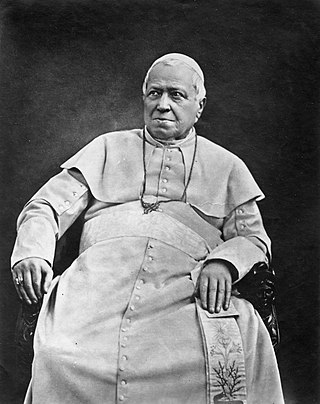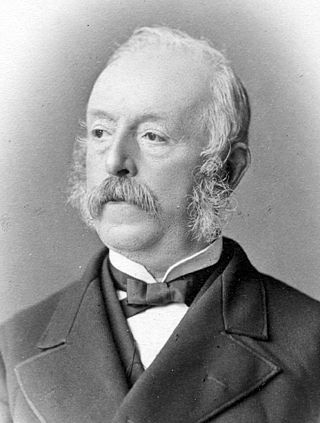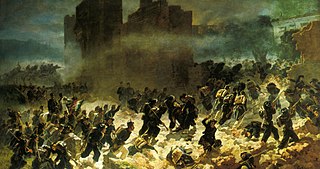
Pope Adrian V, born Ottobuono de' Fieschi, was the head of the Catholic Church and ruler of the Papal States from 11 July 1276 to his death on 18 August 1276. He was an envoy of Pope Clement IV sent to England in May 1265 who successfully completed his task of resolving disputes between King Henry III of England and his barons. Adrian V was elected pope following the death of Innocent V, but died of natural illness before being ordained to the priesthood.

Pope Pius IX was head of the Catholic Church from 1846 to 1878, the longest verified papal reign. He was notable for convoking the First Vatican Council in 1868 and for permanently losing control of the Papal States in 1870 to the Kingdom of Italy. Thereafter, he refused to leave Vatican City, declaring himself a "prisoner in the Vatican".
In English history, praemunire or praemunire facias refers to a 14th-century law that prohibited the assertion or maintenance of papal jurisdiction, or any other foreign jurisdiction or claim of supremacy in England, against the supremacy of the monarch. This law was enforced by the writ of praemunire facias, a writ of summons from which the law takes its name.
A decree is a legal proclamation, usually issued by a head of state such as the president of a republic, or a monarch, according to certain procedures. It has the force of law. The particular term used for this concept may vary from country to country. The executive orders made by the President of the United States, for example, are decrees.

Marco Minghetti was an Italian economist and statesman.

Cento is a town and comune in the province of Ferrara, Emilia-Romagna, Italy.

The mayor of Rome is an elected politician who, along with the Rome City Council of 48 members, is accountable for the strategic government of Rome. As Rome is a comune speciale since 2009, the office is different from the offices of the other Italian cities. The title is the equivalent of Lord Mayor in the meaning of an actual executive leader.
The Prince Assistant to the Papal Throne was a hereditary title of nobility available in the Papal Court from the early sixteenth century until the reforms of Pontificalis Domus by Pope Paul VI in 1968, when the Papal Court was reformed into the current Papal Household. The title is not currently in use, though it has not been formally suppressed.

The Order of Pope Pius IX, also referred as the Pian Order, is a papal order of knighthood originally founded by Pope Pius IV in 1560. Currently, it is the highest honor conferred by the Holy See .The awarding of the order fell into disuse and was re-instituted by Pope Pius IX as a continuation on 17 June 1847.

The Battle of Castelfidardo took place on 18 September 1860 at Castelfidardo, a small town in the Marche region of Italy. It was fought between the Royal Sardinian Army – acting as the driving force in the war for Italian unification, against the Papal States.

The Capture of Rome on 20 September 1870 was the final event of the unification of Italy (Risorgimento), marking both the final defeat of the Papal States under Pope Pius IX and the unification of the Italian Peninsula under the Kingdom of Italy.
Capital punishment in Vatican City was legal between 1929 and 1969, reserved for attempted assassination of the Pope, but has never been applied there. Executions were carried out elsewhere in the Papal States, which was the predecessor of the Vatican City, during their existence.
The Vatican Publishing House is a publisher established by the Holy See in 1926. It is responsible for publishing official documents of the Roman Catholic Church, including Papal bulls and encyclicals. On 27 June 2015, Pope Francis decreed that the Vatican Publishing House would eventually be incorporated into a newly established Secretariat for Communications in the Roman Curia.

Abdication is the act of formally relinquishing monarchical authority. Abdications have played various roles in the succession procedures of monarchies. While some cultures have viewed abdication as an extreme abandonment of duty, in other societies, abdication was a regular event and helped maintain stability during political succession.

Holy See–Malaysia relations are foreign relations between the Holy See and Malaysia.
The Legion of Antibes, also known as the Roman Legion was a formation of the Papal Army created on 8 September 1866 consisting of French Volunteers.

The resignation of Pope Benedict XVI took effect on 28 February 2013 at 20:00 CET, following his announcement of it on 11 February. It made him the first pope to relinquish the office since Gregory XII was forced to resign in 1415 to end the Western Schism, and the first pope to voluntarily resign since Celestine V in 1294.
Events from the year 1903 in Italy.

Holy See–Kurdistan Region relations are bilateral relations between Holy See and Kurdistan Region. The Holy See has no representation in Kurdistan Region and the latter has no representation in the Holy See.

Brazil–Holy See relations are the current and historical relations between Brazil and the Holy See. Catholicism was introduced in Brazil in 1500 by the Portuguese Empire, and it is the country's predominant faith. Brazil also has the world's largest Catholic population. Since the adoption of the Constitution in 1891, Brazil is a secular nation.





















